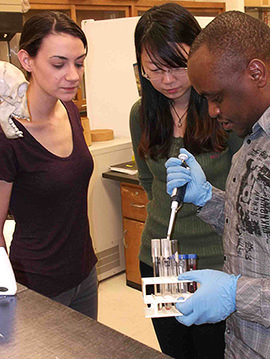If you’ve ever watched popular crime shows, and marveled over how the police are able to solve crimes and catch bad guys using DNA evidence obtained from a hair sample the size of a speck of dirt, you might be interested in forensic science. Police detectives work very hard, but they can’t always do it on their own without a little help from scientists. One of the most important aspects of a criminal case is evidence. Without it, there’s no case. This is where you, as a forensic scientist, can help.
What You Do
Crime scene investigators (CSI) are the people who sometimes come onto the scene of a crime to collect evidence and analyze it. Some work primarily in a lab, however most want to come to a crime scene to make sure that evidence is handled properly.
Evidence handling procedures are a crucial part of the process because improper handling can invalidate any analysis done at the lab. It’s also important not to tamper with anything prior to, or after, the collection.
For example, fibrous material containing blood must be collected in a paper bag – instead of plastic – to discourage mold growth. It must also be kept in a refrigerated – but dry – storage. While much of the work is done in a lab, CSI agents must generally be “on-call” for going out to crime scenes. There’s really no way around this requirement because getting evidence back to the lab quickly is often the difference between a successful and unsuccessful analysis.
Your Education Requirements
Generally, you must have at least a bachelor’s degree in forensic science or some other natural science. However, you might be able to get by with a certificate from a vocational or technical school. Your only other route of entry is to be hired as a lab technician. You won’t have all the luxuries of an actual scientist, but you will be able to work under the direct supervision of one and you can typically work your way up the ladder.
You must also have strong written and oral communication skills. CSI techs must work closely with detectives and investigators, make full reports that will be used in court proceedings, and must be able to communicate ideas to the detectives they’re working with.
Job Growth and Salary
Fortunately, the outlook for this job is amazing – 20 percent growth through 2018. Starting salary is about $55,000 annually, and you can expect raises periodically. Now for the downside – you’ll work long and grueling hours. You’ll definitely be earning your keep.
Don’t do this job for the money – you’ll often find yourself being called out at all hours of the night to collect evidence. Even though you may ordinarily be scheduled Monday through Friday, crimes happen at all hours of the day and criminals don’t take weekends off.
Since more and more law enforcement agencies are utilizing technology and DNA analysis to help them solve crimes, you can expect a lot of work if you’re hired – and a long and rewarding career if you’re scientifically inclined.
Darryl Adkins is a former criminal pathologist. Now retired, he enjoys writing posts on various Internet websites. Visit the link to learn much more about how to get your masters degree for federal law enforcement.





